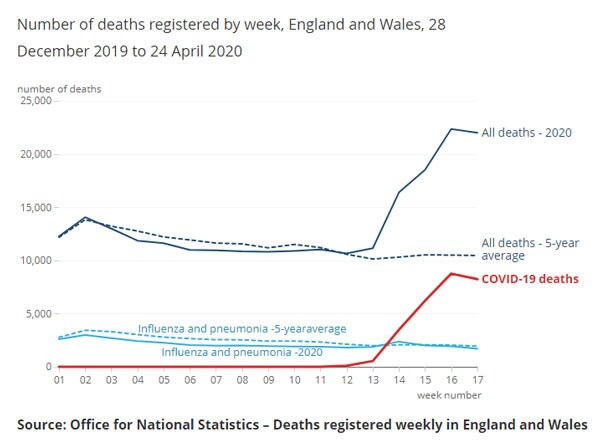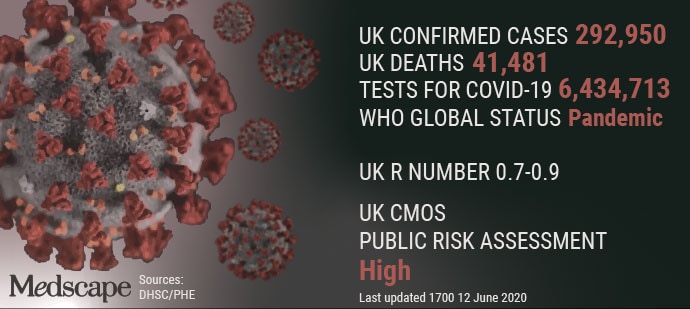These are the UK coronavirus stories you need to know about today.
Cyber Attack Warning
A warning has been issued over the threat of cyber attacks on national and international organisations involved in the COVID-19 response, such as vaccine researchers. The joint advanced persistent threat (APT) warning is from the United Kingdom’s National Cyber Security Centre (NCSC) and the US Cybersecurity and Infrastructure Security Agency.
Targets include healthcare bodies, pharmaceutical companies, academia, medical research organisations, and local government. "APT actors may seek to obtain intelligence on national and international healthcare policy or acquire sensitive data on COVID-19 related research," NCSC warned.
It goes on to say the shift to homeworking could result in more vulnerabilities and attacks on virtual private networks (VPNs).
Large-scale 'password spraying' attacks using commonly hacked passwords are being investigated.
NCSC Director of Operations Paul Chichester said in a news release: "Protecting the healthcare sector is the NCSC’s first and foremost priority at this time, and we’re working closely with the NHS to keep their systems safe.
"By prioritising any requests for support from health organisations and remaining in close contact with industries involved in the coronavirus response, we can inform them of any malicious activity and take the necessary steps to help them defend against it.
"But we can’t do this alone, and we recommend healthcare policy makers and researchers take our actionable steps to defend themselves from password spraying campaigns."
Foreign Secretary Dominic Raab told the Downing Street briefing: "We have clear evidence now that these criminal gangs are actively targeting national and international organisations which are responding to the COVID-19 pandemic, which I have to say, makes them particularly dangerous and venal at this time.
"So we're working with the targets of those attacks, with the potential targets, and with others to make sure that they're aware of the cyber threat, and that they can take the steps necessary to protect themselves, or at the very least mitigate the harm that could be wrought against them."
The NHS was affected by cyber attacks in 2017 which resulted in some hospital closures and cancelled appointments.
In February NHS Digital said: "Over the last 2 years, the NHS has embarked on one of the most ambitious and aggressive cyber security programmes seen in any health and care system in the world."
It said measures included:
- Better cyber monitoring, threat intelligence, and incident responses
- Better support and guidance for local organisations
- Better cyber training and greater awareness and engagement with cyber security best practice among NHS staff and organisations
ONS Data
The Office for National Statistics (ONS) updated data for England and Wales for all settings where COVID-19 is mentioned on a death certificate. Up to 24th April there were 27,356 deaths involving COVID-19.
Overall, 37.4% of all deaths registered in Week 17 (to 24th April) mentioned COVID-19 compared with 39.2% of all deaths in Week 16 (to 17th April).

ONS said the number of deaths so far this year is 229,294. That's 33,593 more than the 5-year average.
Care Quality Commission data on care homes in England showed that between 10th April and 1st May there were 6391 COVID-19 deaths, of which 2044 occurred in the week up to 1st May.
"The UK has been hit very hard in this wave of COVID-19," commented Professor James Naismith, director of the Rosalind Franklin Institute and University of Oxford, via the Science Media Centre. "We are now well past the peak number of deaths in hospital.”
He continued: "There are so called ‘excess’ deaths this year compared to last year, that are not identified as COVID-19. We urgently need to identify the cause of these deaths. There are many plausible theories as to their cause, however, we need real data on this urgently.
"The data indicate that the peak of daily deaths in care homes has passed but occurred later than the peak in hospitals."
Daily Deaths and Case Data
Another 693 UK COVID-19 deaths were announced today taking the total to 29,427.
Of the 366 deaths in English hospitals, patients were aged between 29 and 99. Of these, 14 aged between 49 and 85 had no known underlying health condition.
Deputy Chief Scientific Adviser Dame Angela McLean gave the Downing Street briefing an update on the latest data.
Another 84,806 COVID-19 tests were carried out or put in the post in the last 24 hours, again below the 100,000 daily test target.
There were 4406 new COVID-19 cases.
On hospital bed occupancy: "The peak in London was much higher than everywhere else, perhaps very slightly earlier, and the fall in the number of people in hospital in London has been faster than everywhere else."
On critical care bed use: "That also has fallen from its peak in early April, now down to less than a third of all critical care beds being occupied by COVID-19 patients. It's been decreasing for most of the UK over the last 2 weeks, and it's beginning to come down to what one might define as more manageable levels."
On deaths: "The number of COVID recorded deaths is falling and has been falling steadily since the middle of April."
Dame Angela also commented on today's ONS data: "Whilst deaths in hospital have been falling, deaths in care homes in the week to the 24th of April were still rising to the extent that in that week deaths in care homes were about half as many as all the deaths in hospitals.
"I think what that shows us is that there is a real issue that we need to get to grips with about what is happening in care homes."
She was asked to comment on the likelihood of the UK being hardest hit in Europe for COVID-19 deaths: "I think we have decided that our measure of how things have gone will be age-adjusted all-cause mortality because that will capture all kinds of impacts of COVID not just the COVID deaths. And clearly, it'll be important to do what we can to make international comparisons, everybody knows that making international comparisons in such statistics can be difficult, and it may be that that will take some time to sort out, and this isn't over yet."
NHS and Healthcare Deaths
Among recently announced NHS deaths was GP Dr Saad Al-Dubbaisi.
The Chair of NHS Bury CCG Dr Jeff Schryer paid tribute: "Dr Al-Dubbaisi, was a much loved, compassionate and experienced GP from Garden City Medical Centre. He lived and worked in Bury, and was a popular and caring member of our General Practice community. Dr Al-Dubbaisi cared for generations of the same families from his Practice in Holcombe Brook for many years, he will be sorely missed by his work family and patients."
In Memoriam: Healthcare Workers Who Have Died of COVID-19.
More News in Brief
- Scotland's First Minister, Nicola Sturgeon, says it is unlikely lockdown measures will be eased when they are reviewed on Thursday. However, she's been talking about possible changes when the time is right: "Firstly, if and how we could safely change our advice on spending time outdoors, to allow exercise outside to happen more than once a day so long as we continue to stay apart from people outside our own households. But second, we're also considering if a slight relaxation in the rules to allow meeting up with a small defined group of people from other households, in a sort of bubble, might be possible, even if initially, that was only possible out of doors and not indoors." She also said Scotland's R number may be higher than the rest of the UK, "although the modelling that is based on is subject to a high degree of uncertainty".
- Last week we reported on Doctors' Association UK's (DAUK) concerns about guidance to coroners in England and Wales that seemed to suggest inquests were not an appropriate way to determine if PPE issues played a role in healthcare workers' deaths. DAUK has now received a letter from the Chief Coroner clarifying that "inquests are not suitable forums to discuss national or high level policy matters". However, Mark Lucraft QC wrote: "Coroners are independent judges. They make their judicial decisions independently on a case-by-case basis in accordance with the law and they exercise their judicial duty and discretion in relation to any death, including that of a healthcare worker, which is reported to them."
- UK experts have reacted to French research that found a COVID-19 case from late December after retesting samples. Dr Simon Clarke, associate professor in cellular microbiology, University of Reading, commented via the Science Media Centre: "This is an extremely interesting claim. Assuming it's not a case of a false-positive result, it will be important for French authorities to thoroughly investigate the movements of this patient prior to admission to hospital and to examine their medical records to see if their symptoms and disease progression were more like COVID-19 than flu. If the coronavirus had indeed spread to Europe in December, it's worth asking why it took so long for case numbers to begin to escalate." Prof Jonathan Ball, professor of molecular virology, University of Nottingham, said: "We know from evidence that the virus first started to infect humans around mid-November with the early outbreak focussed on Wuhan City and the immediate Hubei province. Whilst it was possible that virus could have been exported from there to other parts of the world, the individual in the case report hadn’t had any travel history, and so would have been part of a transmission chain. If he was infected then, you would expect a more rapid and earlier spread of virus in France than was seen."
- Doctor and MP Dr Rosena Allin-Khan has had messages of support after being criticised for her tone while tackling England's Health Secretary Matt Hancock in the Commons over a lack of testing and COVID-19 deaths. She tweeted: "I will not 'watch my tone' when dozens of NHS and care staff are dying unnecessarily." Doctors Association UK thanked her "for advocating for doctors and NHS staff so eloquently. This is shameful from the Health Secretary."
- Video calling the midwife has become more common during the pandemic but pregnant women are still being encouraged to attend antenatal appointments as part of an NHS England campaign. Royal College of Midwives CEO Gill Walton said in a statement: "The current crisis has seen midwives turn to new and innovative ways to maintain contact and carry out some appointments, including by phone or video call. Of course, for some appointments, including scans, there’s no substitute for attending clinics and hospitals." Dr Edward Morris, president of the Royal College of Obstetricians and Gynaecologists, added: "Our key message is that antenatal care is essential and if you are invited to come to an appointment at a hospital or a clinic, it is because these are necessary to support your pregnancy, despite the current pandemic. If you have any concerns or worries about your or your baby’s health – including the baby’s movements – seek medical advice immediately."
See more global coronavirus updates in Medscape’s Coronavirus Resource Centre.





